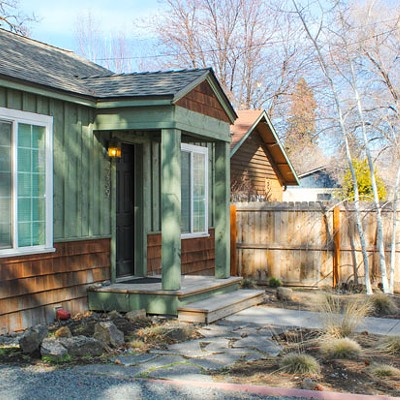"That's a vacation rental," Stephen Junkins says, pointing to a modest but well-maintained mill house as he rides his bike slowly through the River West neighborhood where he lives. "And that's a vacation rental," he adds, gesturing toward another house across the street. He also points out owner-occupied homes, and those with long-term renters, and speculates a similar fate for those for sale or recently sold. As we wind through the neighborhood early on a recent Friday evening, the narrow streets are already filling up with cars showing out of state plates.
"I'm not sure about that one, but I suspect it's going to be a vacation rental," he says, noting the too-neat appearance of a property in the process of being fixed up.
Junkins says vacation rentals have been popping up all over the neighborhood—particularly on Federal Street—for the last couple of years, but he really started paying attention when he discovered his own home was surrounded on three sides, and that about a third of the homes a block to the left and right were vacation rentals.
"It was evident something was happening," he says, adding that once he began digging into city records and vacation rental websites, like Airbnb, he realized the problem was bigger than just his immediate area.
Surveying the nine blocks surrounding his home, Junkins found that they each had between one and four short-term rentals. And that doesn't include the homes he can't be sure of. He created a map to illustrate the density, which ranges, according to his calculations, from 7 to 40 percent, depending on the block.
"For us, the experience has been that neighbors are replaced by customers," Junkins explains. "We get new customers every few days. Sometimes they're awesome people, sometimes they're not. Any relationship you build with them is ephemeral. They're not neighbors."
Forcing Out Families
Junkins and his remaining neighbors say that the creeping takeover of vacation rentals is pushing out residents and goes against the spirit—if not the letter—of single family residential zoning.
At the July 28 meeting of the planning commission, Junkins expressed these very concerns—timely testimony as the commissioners followed his remarks by announcing the launch of a residential code initiative to examine where vacation rentals fit into that legal definition. And while Junkins is happy to see the planning commission taking up the issue, he worries change won't come soon enough.
"Vacation rentals don't belong in residential neighborhoods," Junkins says. "One or two might be okay, but allowing entire streets and blocks? That's not what we want," adding, "it's taking close-in housing away from residents."
He points to a prime example, a large vacation rental property directly bordering Harmon Park. These homes, he argues, should be for families with children who want to be able to walk to parks, schools and shops. Instead, it serves as a revolving door for tourists. And even when one of these well-situated homes comes on the market, Junkins says the potential for commercial profit drives up prices, putting these increasingly popular properties out of reach for many families.
"I love tourists, they contribute to diversity," Junkins claims. "But we're at risk of having neighborhoods converted into mini-hotel districts."
Airbnb alone lists some 98 vacation rentals (full houses, not just rooms) in downtown Bend, with prices ranging from $75 for a studio to $660 a night for a four-bedroom riverfront "estate."
One property, for example, a two-bedroom home that sleeps up to five adults and goes for $225 a night (with a three-night minimum). It is currently booked all but one day in August, meaning that the property owners stand to rake in $5,400 to $6,750 this month, which doesn't even include cleaning fees, or the $20 per night additional charge if more than two guests stay there. All told, it's $4,000 to $5,000 more a month than a comparable westside, longterm rental could fetch.
It's this fast inflating climate that has long-term renters like Amy Meadows, a single mother of two who lives just behind Junkins, worried. She says that even though her landlord doesn't seem interested in converting the property (they didn't even raise rent with her first year's lease renewal—a rare blessing in a tight rental market), she's still losing sleep over the possibility she'll be pushed out of the neighborhood.
"I've had nightmares about it, literally," Meadows confesses. In the bad dreams, which appeared just as her lease was coming up for renewal, she comes home to find the landlord repainting the place and is kicked out with no notice. "It creates sort of a feeling of insecurity when you see this happening [in the neighborhood]."
In the last home Meadows rented, also on the west side, she says she learned just two weeks after moving in that the landlord was planning to sell the property. Though she was given 60 days notice to move out near the end of her lease term, Meadows says it took her an additional two months to find a place to live—during which time she moved in with a friend.
"I think because it's a highly coveted area, it took a lot to find this place," she says. "I know next time if it happens it'll be even harder to find a place."
Taking Customers from B&Bs
The gaining popularity and traction of this style of short-term, informal vacation rental also is worrying some owners of traditional bed and breakfasts.
Annie Goldner, who has owned and operated the Hillside Inn B&B on the westside since 2002, says she attributes a major dip in this year's revenue to the rise of vacation rentals.
"I did not feel an impact on my B&B revenue last year, but have this year," Goldner says. "January, February and March sales were 68 percent less than the year before. Projecting forward, I may be 20 to 25 percent down in revenue for the year."
"Half of the vacation rentals are owned by people who do not live in Bend," Goldner claims. "I have looked up the addresses of the list of properties paying Bend's transient room tax and reconciled the address to the county's property tax list, so [I] know this for a fact."
She compares these non-locally owned rentals to timeshares in a resort. Owning a vacation rental gives out-of-towners a place to stay when they visit and extra income while they are away.
"I totally understand the attraction and profitability of owning and using vacation rentals," Goldner offers. "If you run the numbers, a vacation rental owner will make three to four times the rental income than if they chose to do a long-term lease and they get to use the home when they want to do so to visit Bend."
A Not-So-Neighborly Nuisance
As the saying goes: "When the parents are away, the kids will play." While some vacation rental hosts greet their guests when they arrive, most properties have no on-site staff or oversight. As a result, guest behavior is not monitored and addressed the way it would be at a hotel or bed and breakfast.
Bob Griffin, a 74-year-old resident of Federal Street, knows this all too well. Because the houses in that area are built pretty close together, he says his bedroom window is a mere 10 feet from the patio where tourists hang out while renting the property next door. His doctor says he needs to get more sleep, but turning in at 8 pm is a challenge when the current crop of visitors is still reveling.
"I don't blame them," Griffin says. "They have a right to do it. To me it's just the wrong use [of the neighborhood]."
In addition to the noise, he has to deal with parking headaches. Because he is recovering from a broken neck, sustained last year while fishing, Griffin uses a wheelchair to get around. He had a ramp built from his home of 26 years to the street, and sometimes takes advantage of Dial-A-Ride, with its convenient wheelchair lift. But that's hard to do when vacation renters park in front of his ramp.
"If I had real neighbors, they'd know my situation, and have the courtesy not to block my ramp," Griffin explains.
"If I was a businessman I'd buy up a bunch of them, but pardon my French, it really fucks up the neighborhood," Griffin says. "I'd say one or two [vacation rentals] to a block is one or two too many. Let's support hotel districts and not destroy family neighborhoods."
Neighborhood Blight or Boon?
But some of those locals who own vacation rentals say their properties are benefiting neighborhoods by taking homes that were once eyesores and giving them new life.
Sarah Phipps—an interior designer and Airbnb "ambassador"—has converted three Bend properties into vacation rentals, which she began renting out last June under the company name Cottage Bend.
"The property, when I purchased it, was really run down. It had a bunch of snowboarders living in it, weeds everywhere," Phipps explains. "I think a lot of people in the neighborhood are happy because it has added to the neighborhood."
Last year, the Central Oregon Association of REALTORS (COAR) gave Phipps a Build a Better Bend Award for Exceptional Repurposing of a Residential Structure for her cottage at 911 Albany Ave.
"I used to run a bed and breakfast destination resort in Colorado. I take hospitality pretty seriously," Phipps says, explaining that she was careful about ensuring her properties met city requirements for parking and paying the transient room tax.
She says her guests—often in town for bike races, concerts and other local events—are pretty mellow. Even so, she has received two complaints. The first, a noise complaint, came when she was staying at the cottages with her own family, celebrating a high school graduation.
"It was grandmas and grandpas, nothing crazy," Phipps explains. "We lost track of time and after 10, during a raucous game of charades, a really nice policeman came by and told us we needed to keep it down."
The cottages also received a parking complaint when a film crew renting the properties for a commercial parked where they weren't supposed to. But on the whole, she says, response to her vacation rentals has been positive. And the city benefits from the money brought in by both the transient room tax and the tourists who stay in vacation rentals.
"I've lived a lot of different places," Phipps says. "There's a reason Bend is the way it is, and it takes money to do that."
Finding Balance
The planning commission, which has received a number of complaints from residents concerned about vacation rentals, addressed the issue head-on at its July 28 meeting. With representatives from the city's neighborhood associations in attendance, commissioners announced they are considering revisions to the residential code—eventually.
"We're beginning the process of developing...gosh that sounds too complicated," Planning Commission Chair Bill Wagner said at the meeting. "We thought we'd talk to you first before we even design the process."
City Manager Eric King says the city is aware of the diverse perspectives on vacation rentals and that council will likely hold a joint meeting with the planning commission in the coming months to discuss these and other issues.
"It's a balancing act of wanting to have options for visitors to come to Bend," King says, "but not disrupt the livability of neighborhoods."
While residents say they are glad the commission is planning to take on vacation rentals, they are concerned about the extended timeline, saying that if the city doesn't take speedy action, entire streets may be lost to vacation rentals. Monte Payne, who also lives on Federal Street, says he's seen it go both ways.
"I've lived in college towns all my life," Payne explains. "In Chico, they didn't plan, they just grabbed with both hands for money, [whereas] in Davis, they got ahead of the game, and it's a very nice place to live."
He says there's a lesson to be learned in the experiences of other cities, but time is running out.
"City Council and the planning department need to get ahead of this, but they're looking two years down the road," Payne says. "In another six months to a year, [Federal Street] will be a hotel district for Galveston."
"The very least they could do for us is stop issuing permits," Payne says. "They need to take a breath."
Tourist Towns Rein in Rentals
Concerns over vacation rental density are not unique to Bend. Other cities in tourist-friendly destinations have taken a variety of approaches to balancing the needs of visitors and residents.
Portland
The short-term rental of whole houses or multifamily units is currently not allowed (but up for reconsideration later this year). The city approved on July 30 the Airbnb-style rental of rooms within residential properties, provided the owner lives there at least nine months out of the year. Worth noting: Airbnb recently opened offices in Portland.
Ashland, Girabaldi, Depoe Bay
Residential code prohibits the rental of homes, cottages or rooms for fewer than 30 days in single-family residential zones.
Manzanita
Vacation rentals are allowed in residential areas, but their density is capped at 17.5 percent.
Seaside
The city has carved out short-term rental-free zones and requires planning commission review for vacation rentals seeking a permit in a neighborhood already at 20 percent density.
Cannon Beach
Total vacation rental permits—good for five years—are capped at 92. All other interested parties go on a waiting list.
Durango, Colo.
One vacation rental is allowed per street segment, subject to neighbor approval.



























